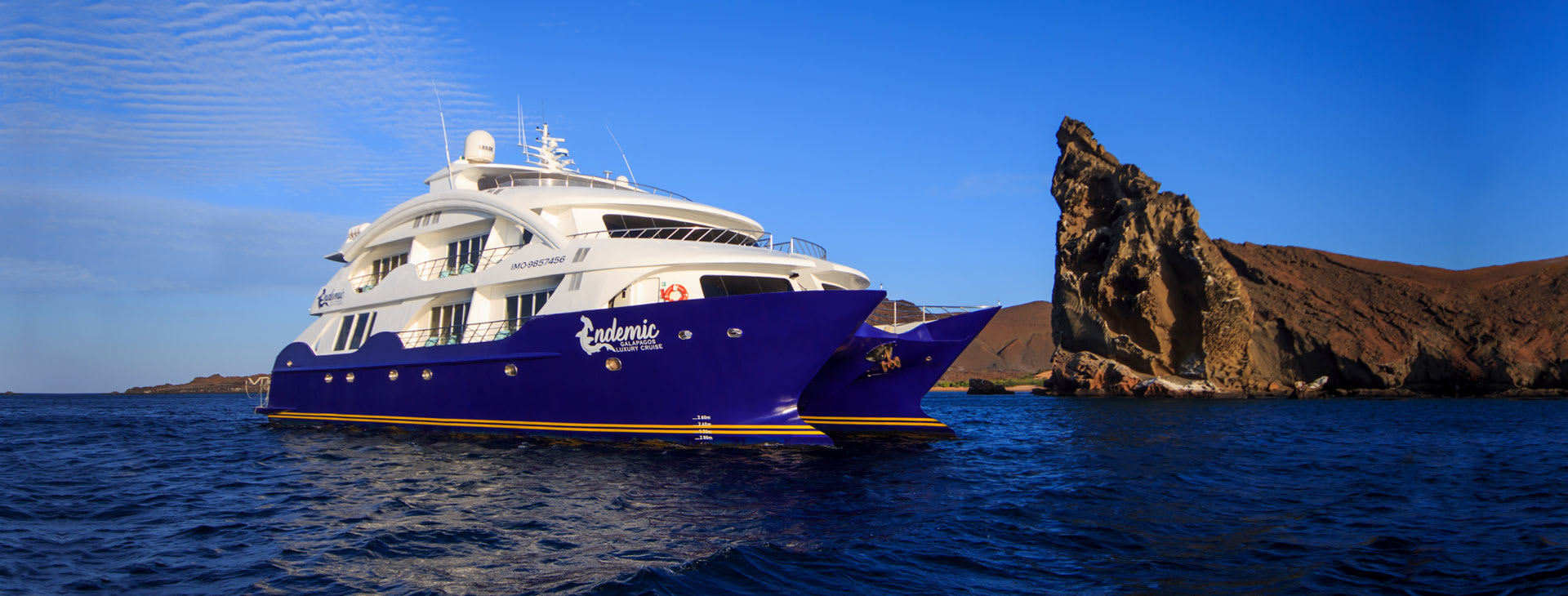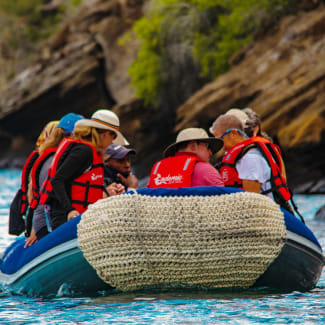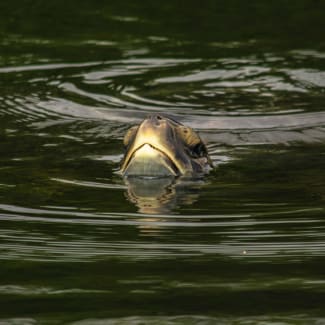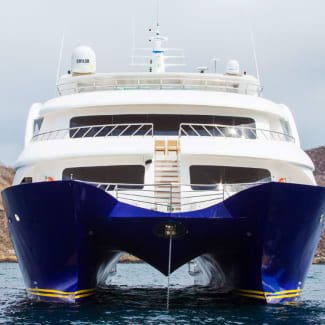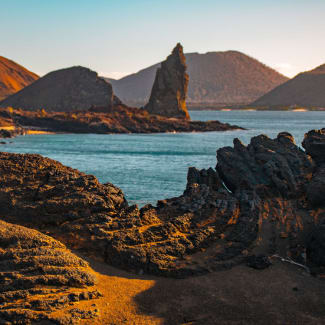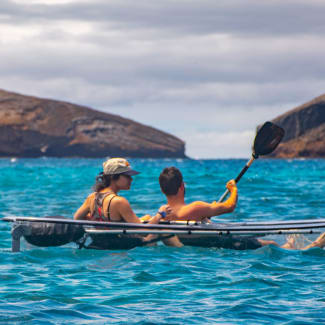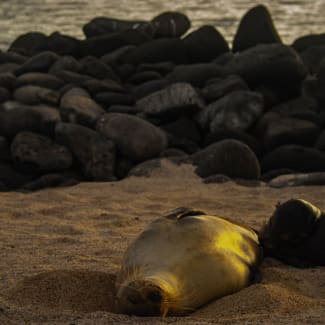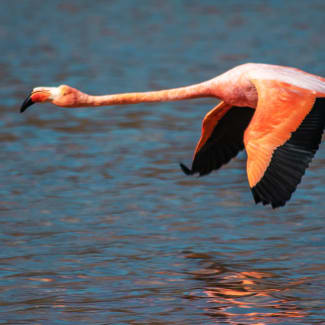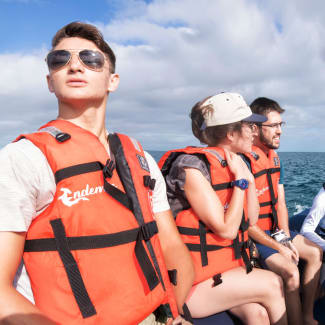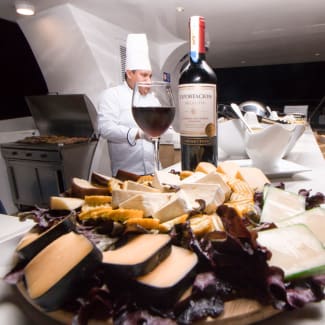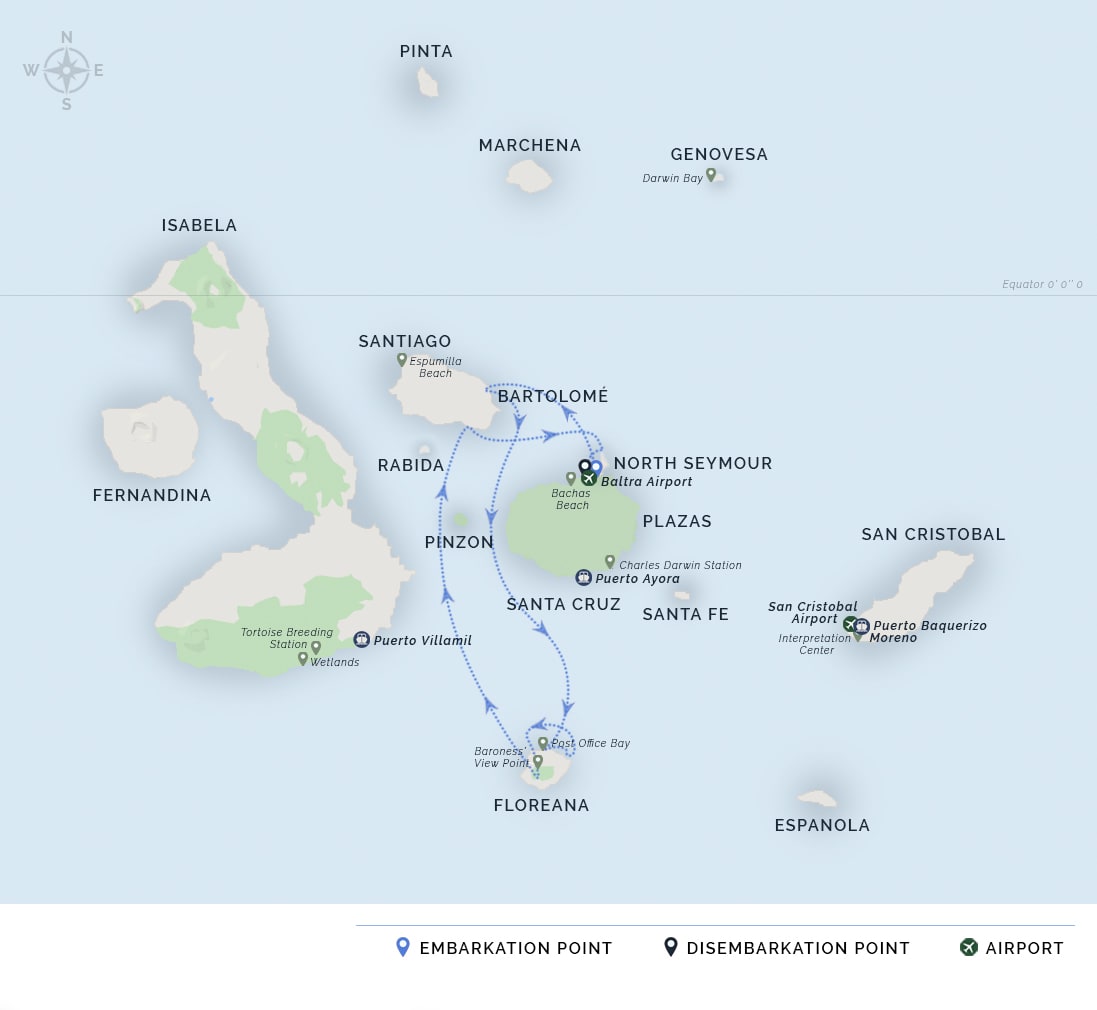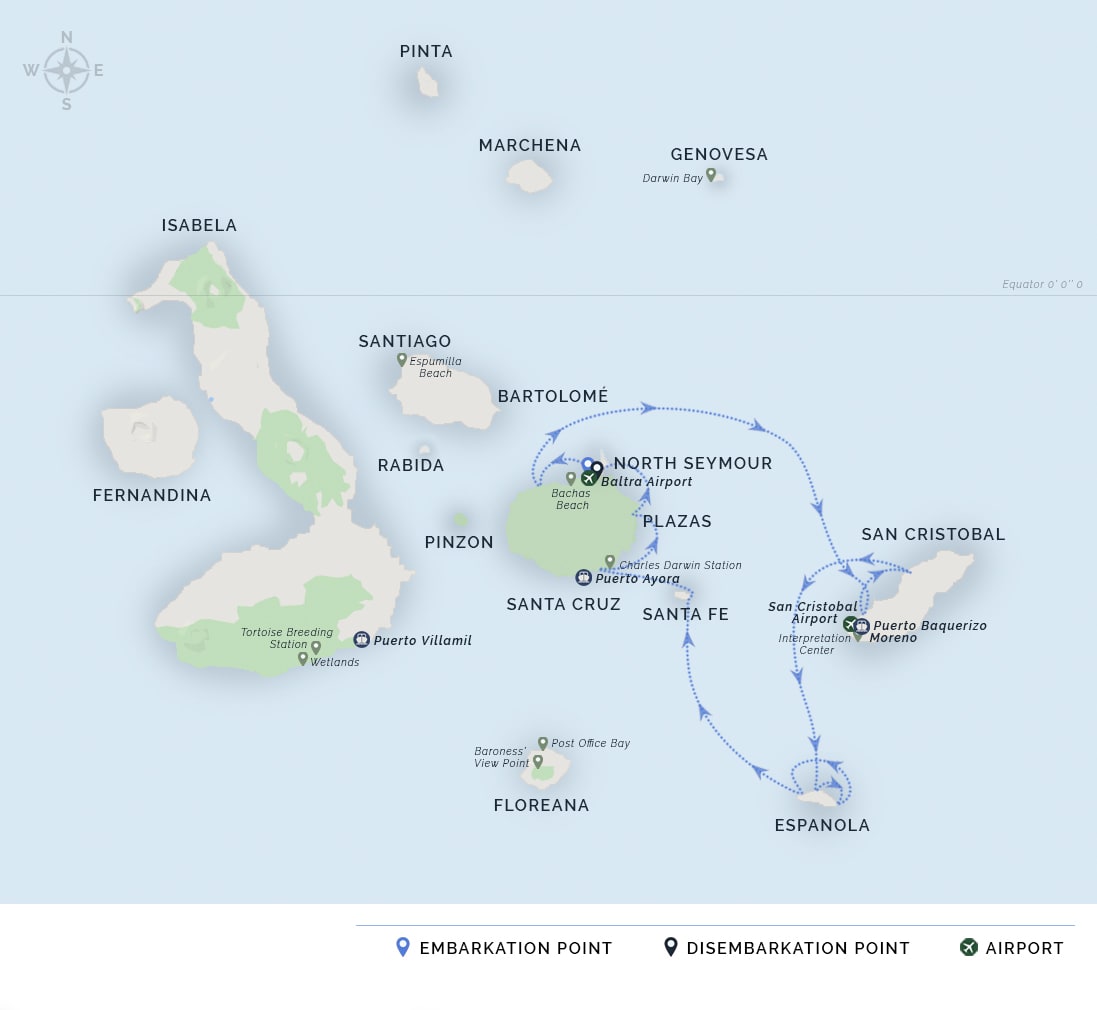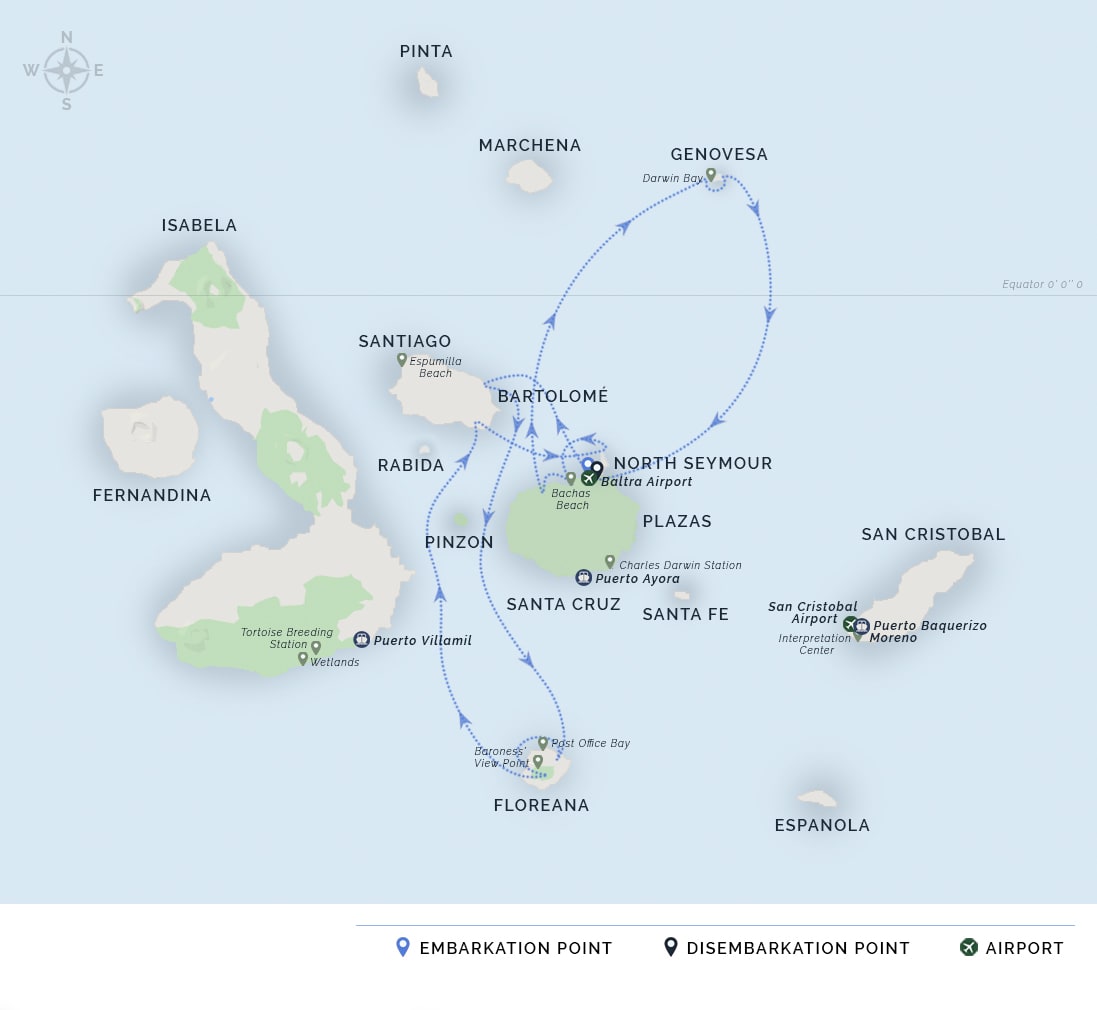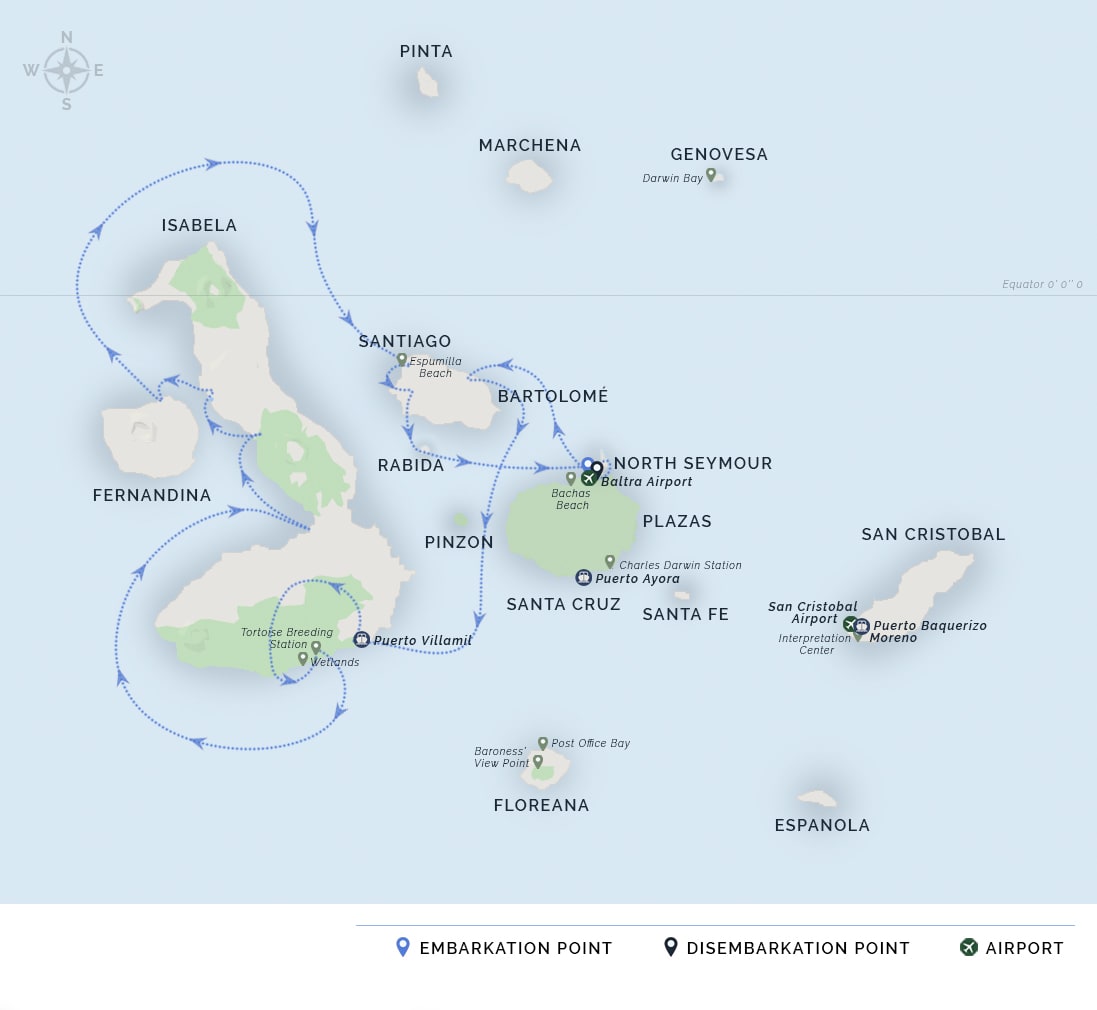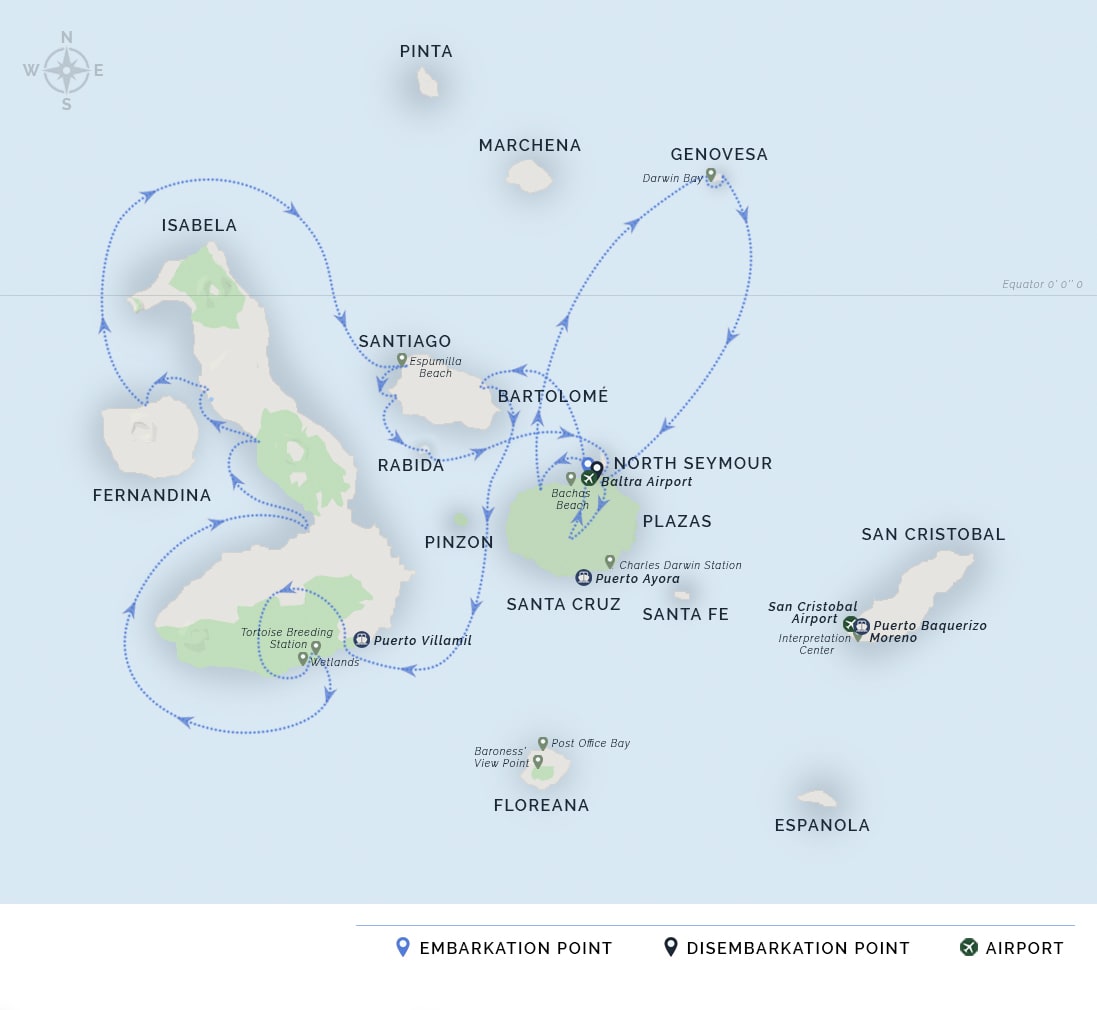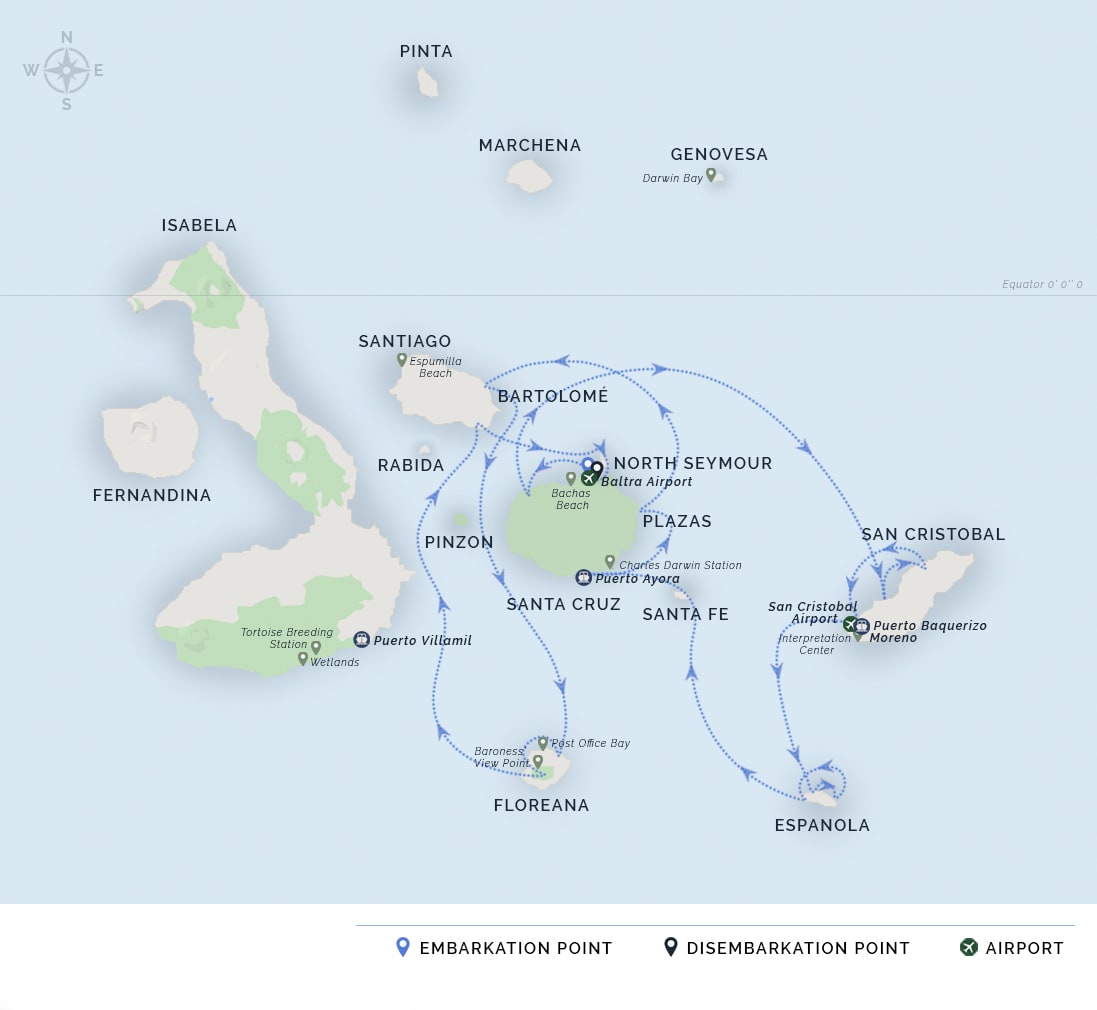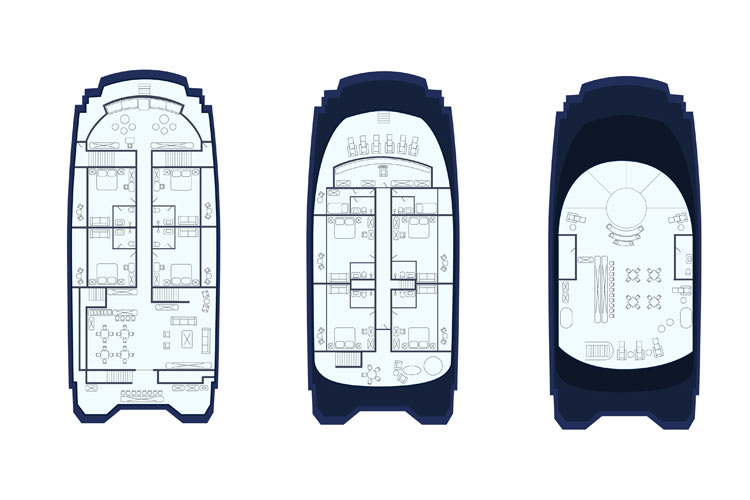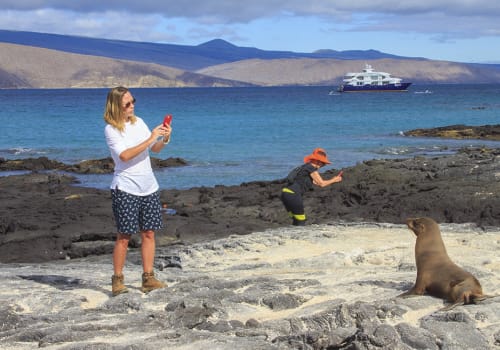Overview
The Endemic, built in 2018, is a sleek, modern cruise ship with nine suites, including one cabin for solo travelers. The contemporary elegance of the bright white and soft wood tones of the interior and exterior spaces is the perfect complement to the brilliant blue waters of the Galapagos Islands.
Life Aboard The Endemic Cruise Ship Galapagos
Imagine waking up in your spacious cabin and stepping out onto your private balcony to watch the sunrise over the Galapagos Islands. While aboard the Endemic, you will feel at home on a ship that balances luxurious private spaces with entertaining social areas. The sky deck’s whirlpool is the ideal spot to relax while watching exotic species, such as frigatebirds, fly by. Be sure to ask for a cocktail or a tasty non-alcoholic beverage from the indoor or outdoor bar before settling in for your soak.
For a drier way to enjoy some wildlife spotting, ease into a comfortable chair on the main deck’s sun terrace at the bow of the ship. It’s the perfect place to watch everything from sea lions to blue-footed boobies. Fuel all of your adventures with meals from locally-sourced ingredients expertly prepared by the ships’ chef. But your favorite meal just might be the BBQ that is served alfresco on the sky deck.
Excursions From Your Endemic Galapagos Cruise
The Endemic offers cruises of four, five, six, and eight days, ensuring there is something for every wildlife lover, regardless of the amount of time you have to devote. The activities presented during each itinerary are carefully curated to allow all 16 guests aboard the ship to have up-close-and-personal experiences with Galapagos’ native species while also protecting the fragile ecosystem.
A highly-trained guide, certified by the Galapagos National Park, will lead hikes, snorkeling excursions, beach walks, and dingy rides. Highlights of your time may include snorkeling with penguins on Bartholomew Island, a visit to a turtle breeding center on Santa Cruz Island, and a hike to see flamingoes in a lagoon on Floreana Island.
Galapagos Explorations For All Ages
It’s never too early or too late to make the dream of a Galapagos cruise come true. The Endemic offers facilities and programs for every stage of life. Celebrate retirement in style on the senior-friendly vessel, which has few stairs and easily accessible decks and public areas. If swimming and hiking aren’t for you, activities during your Endemic Galapagos cruise can be tailored to your lifestyle.
The crew of the Endemic is also delighted to welcome children aboard. A Galapagos cruise is an excellent way to introduce young people to the joys of travel while teaching important lessons about environmental responsibility. The crew takes pride in showing children the area’s wildlife, and there are kid-friendly DVDs in the TV room. The chef will even create kid’s meals that are sure to please even the pickiest eaters.
If you are celebrating a milestone birthday, anniversary, or the start of a well-earned retirement, the crew of the Endemic will make the moment special with décor and treats. But, why wait for a special occasion? Every day of an Endemic Galapagos cruise is a celebration.
Itineraries & Prices
All itineraries are subject to change due to seasonal weather conditions (and resultant variations in river and tributary water levels) affecting accessibility to locations. Thus navigation routes, times and excursions may need to be modified at the cruise captain’s or your guide's discretion.
Embarkation
AM: Upon arrival, reception, and assistance at the airport, transfer from Baltra Airport to the M/C Endemic. We will embark at 10:15 AM from Baltra Port.
PM: After lunch, you will discover Bartholomew Island. Once here, you will ascend to admire the spectacular panorama of Sullivan Bay and the famous Pinnacle Rock. The beaches at the foot of the Pinnacle Rock are excellent for snorkeling from which you can discover the marvelous underwater world, and with a little luck, you’ll get to snorkel with penguins.
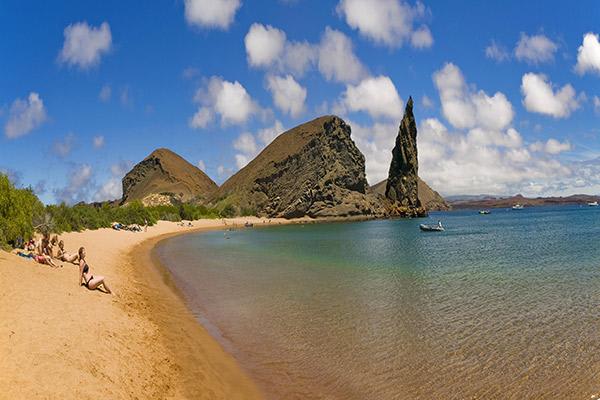
Devil's Crown / Cormorant Point & Baroness’ Lookout / Post Office Bay
AM: In the morning, after breakfast, the first spot to be visited is Devil's Crown that is an underwater volcanic crater, almost covered completely by Galapagos waters. Just a small portion of the rock formation can be seen from above and it looks like a crown. The underwater world is very rich in coral reefs, abundant marine species. Birds are also part of this visitor point due to their location in open waters. Or visit Cormorant Point where you will land on a green olivine sand beach. Following a 100 meters long path you will soon reach a lagoon with flamingos.
PM: In the afternoon, you will visit the Baroness’ Lookout (Mirador de la Baronesa). This viewpoint is located on the north of Floreana Island. The way up and the trail is very easy, steps are placed in this area for security. Your naturalist guide will tell the murder and mystery legend of the Baroness. Or you will go to the Post Office Bay, which keeps the legendary post barrel that whalers historically used to post their mail in.
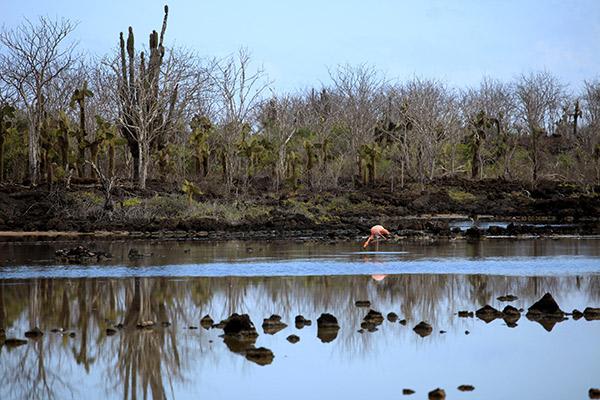
Chinese Hat - North Seymour Island
AM: In the morning, after breakfast, you will visit Chinese Hat, which is a small islet off the south coast of Santiago, with a maximum elevation of 160 feet (52 meters). Though within easy reach of Santa Cruz, Chinese Hat is typically only visited by those aboard a Galapagos Cruise.
PM: In the afternoon, you will discover North Seymour Island. It is located slightly to the north of Baltra. It is a low, flat island, formed by submarine lava formation uplift. Covered with low, bushy vegetation, it contains the largest colony of magnificent frigate birds in the Galapagos. There is also a large population of blue-footed boobies that perform an amusing courtship dance when nesting conditions are right.
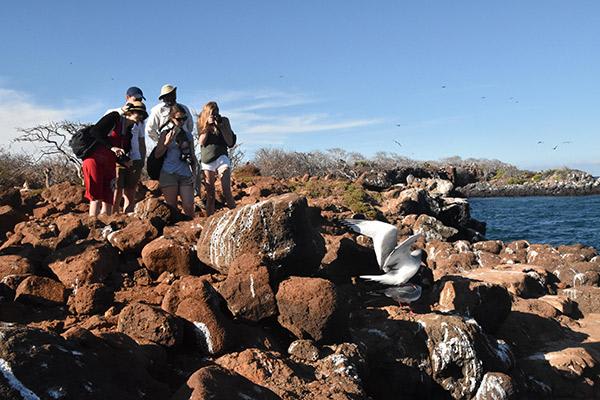
Disembarkation
AM: After breakfast, enjoy the visit to Black Turtle Cove, which is located on the north shore of Santa Cruz. It is a living illustration of how mangroves alter the marine environment to create a rich and unique habitat. Three mangrove species crowd the area from the shore out into the lagoon, which reaches almost a mile inland. As you drift through quiet waters in the zodiac, you are likely to see spotted eagle rays and diamond-shaped mustard rays, which swim in a diamond formation. White-tipped reef sharks slip beneath the boat and Pacific green sea turtles come to the surface for air and to mate. Waterfowl, including pelicans, herons, and egret, all feed in the cove. This is a peaceful place that will make you feel calm.
We will disembark from the cruise at 8:00 AM from Baltra Port. After this last visit, you will be transferred to Baltra airport for your return flight to mainland Ecuador. Assistance will be provided until we bid you farewell at the airport.
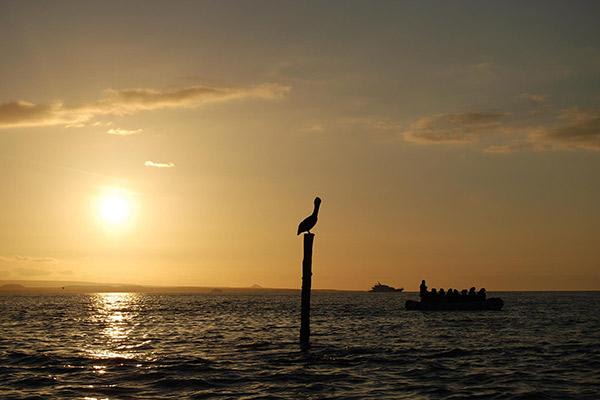
Embarkation
AM: Upon arrival, reception, and assistance at the airport, transfer from Baltra Airport to the M/C Endemic. We will embark at 11:30 AM from Baltra Port.
PM: In the afternoon, visit Dragon Hill will take place, which is located in the north-western part of Santa Cruz island. Here you will have the opportunity to walk into the island and view the land iguana. Be among these magnificent reptiles, that just a few decades ago were on the brink of extinction.
Moreover, at Dragon Hill, you will see a flamingos’ lagoon, pintail ducks, and other endemic birds including flycatchers and warblers. After a short trek, an amazing view awaits us up the hill. Offshore snorkeling before returning to the yacht.
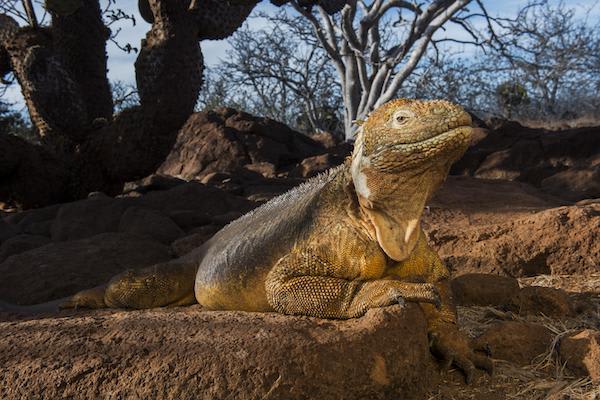
Kicker Rock, Witch Hill & Lobos Island
AM: In the morning, the first spot to be visited is Kicker Rock, an impressive geological formation due to erosion. This is a nesting place of sea birds. Additionally, curious sea lions and marine life can be found, such as fish, turtles, sharks, rays, representing the main attraction for snorkeling. This is a nice spot to take pictures.
The next attraction to see is Witch Hill, a tuff cone hill located southwest of San Cristobal. This name comes from the Spanish name of the bird known in English as Vermilion Flycatcher. A zodiac ride will take passengers into amazing rock formations along the island shore. A white sand beach and crystal-clear waters are part of this enchanted location. Fantastic opportunity for snorkeling.
PM: In the afternoon, you will be taken to Lobos Island, where a small population of blue-footed boobies, frigates, marine iguanas, and great frigate birds nesting can be observed. Snorkeling with sea lions in this calm bay is also part of the excursion.
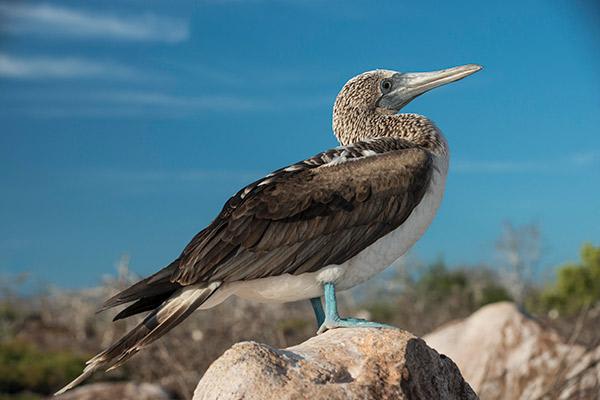
Gardner Bay / Osborn, Gardner Islets & Suarez Point
Española Island will be explored today. You will have the chance to observe endemic wildlife such as the Hood-Mockingbird. This is the southernmost island in the Galapagos archipelago, and home to several wildlife species, including masked and blue-footed boobies. Spectacular views from the top of a cliff.
AM: In the morning, after breakfast, the first attraction to be seen is Gardner Bay that provides an excellent beach for swimming. Around the small islets nearby, snorkelers will find lots of fish and sometimes turtles and sharks. The bay is also frequented by colonies of sea lions who like to swim with you. Or visit the Osborn and Gardner islets that are amazing for underwater discovery. Snorkeling is a highlight on this visitor point.
PM: After lunch, Point Suarez will be visited, which represents one of the most outstanding wildlife areas of the archipelago, with a long list of species found along its cliffs and sand or pebble beach.
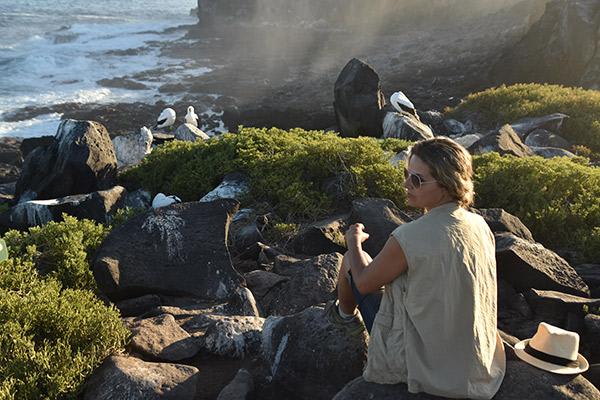
Santa Fe Island & Santa Cruz Island
AM: In the morning, after breakfast, Santa Fe island will be visited, which is one of the most entertaining destinations for shore excursions in the Galapagos Islands. It has two trail choices for visitors, one of which takes you to the tallest Opuntia cactus in the Galapagos. While the other trail takes you into the highlands where land iguanas can be seen. After a long walk, the opportunity to swim in calm waters or snorkel with playful sea lions will be pretty tempting.
PM: In the afternoon, visit the Fausto Llerena Breeding Center and Charles Darwin Research Station. This place has an information center, a museum, a library, and a tortoise breeding station. In the tortoise breeding station, you can encounter tortoises of different subspecies, which are prepared for reintroduction to their natural habitats.
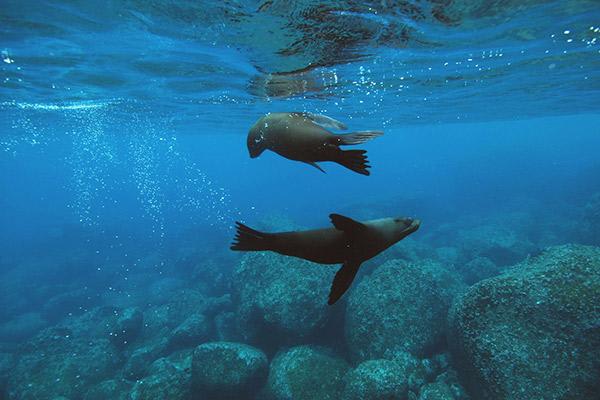
Disembarkation
AM: On your final morning in Galapagos is something special – a visit to Plaza Sur (South Plaza Island). This low, rocky island is populated by cacti and a healthy population of gargantuan land iguanas. The island is also home to the sesuvium plant, which is bright red at certain times of the year. This gives the site an otherworldly look and makes it one of the most picturesque sites in the islands. As you hike, look for boobies diving for fish offshore!
After this last visit, you will be transferred to Baltra airport for your return flight to mainland Ecuador. Assistance will be provided until we bid farewell at the airport.
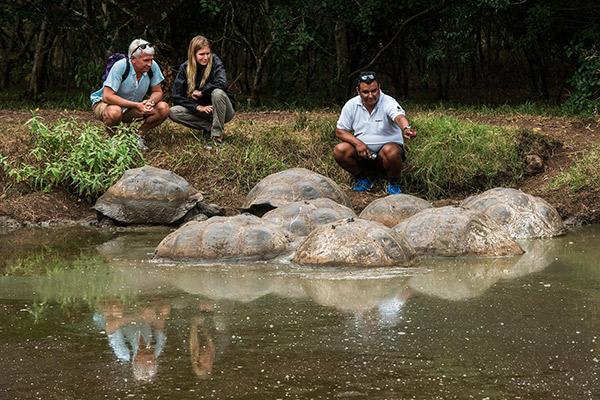
Embarkation
AM: Upon arrival, reception, and assistance at the airport, transfer from Baltra Airport to the M/C Endemic. We will embark at 10:15 AM from Baltra Port.
PM: After lunch, you will discover Bartholomew Island. Once here, you will ascend to admire the spectacular panorama of Sullivan Bay and the famous Pinnacle Rock. The beaches at the foot of the Pinnacle Rock are excellent for snorkeling from which you can discover the marvelous underwater world, and with a little luck, you’ll get to snorkel with penguins.
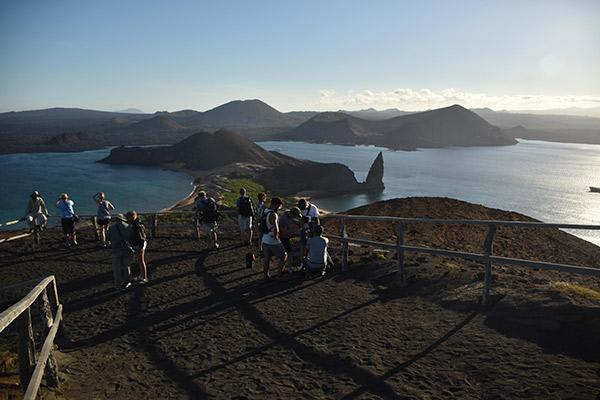
Devil's Crown / Cormorant Point & Baroness’ Lookout / Post Office Bay
AM: In the morning, after breakfast, the first spot to be visited is Devil's Crown that is an underwater volcanic crater, almost covered completely by Galapagos waters. Just a small portion of the rock formation can be seen from above and it looks like a crown. The underwater world is very rich in coral reefs, abundant marine species. Birds are also part of this visitor point due to their location in open waters. Or visit Cormorant Point where you will land on a green olivine sand beach. Following a 100 meters long path you will soon reach a lagoon with flamingos.
PM: In the afternoon, you will visit the Baroness’ Lookout (Mirador de la Baronesa). This viewpoint is located on the north of Floreana Island. The way up and the trail is very easy, steps are placed in this area for security. Your naturalist guide will tell the murder and mystery legend of the Baroness. Or you will go to the Post Office Bay, which keeps the legendary post barrel that whalers historically used to post their mail in.
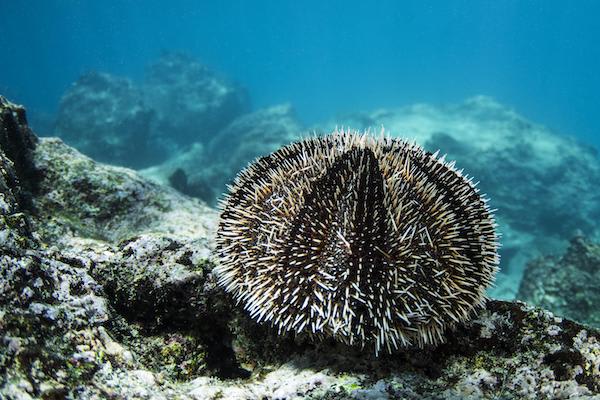
Chinese Hat & North Seymour Island
AM: In the morning, after breakfast, you will visit Chinese Hat, which is a small islet off the south coast of Santiago, with a maximum elevation of 160 feet (52 meters). Though within easy reach of Santa Cruz, Chinese Hat is typically only visited by those aboard a Galapagos Cruise.
PM: In the afternoon, North Seymour island will be discovered. It is located slightly to the north of Baltra. It is a low, flat island, formed by submarine lava formation uplift. Covered with low, bushy vegetation, it contains the largest colony of magnificent frigate birds in the Galapagos. There is also a large population of blue-footed boobies that perform an amusing courtship dance when nesting conditions are right.
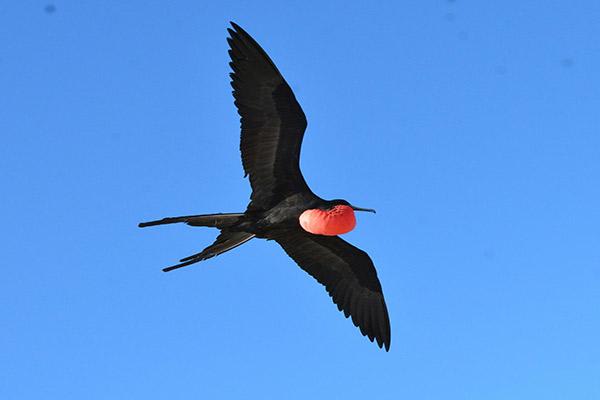
Black Turtle Cove & Las Bachas Beach
AM: After breakfast, enjoy the visit to Black Turtle Cove, which is located on the north shore of Santa Cruz. It is a living illustration of how mangroves alter the marine environment to create a rich and unique habitat. Three mangrove species crowd the area from the shore out into the lagoon, which reaches almost a mile inland.
As you drift through quiet waters in the zodiac, you are likely to see spotted eagle rays and diamond-shaped mustard rays, which swim in a diamond formation. White-tipped reef sharks slip beneath the boat and Pacific green sea turtles come to the surface for air and to mate. Waterfowl, including pelicans, herons, and egret, all feed in the cove. This is a peaceful place that will make you feel calm.
PM: In the afternoon, visit Las Bachas, which is a beautiful white-sand beach, located on the northern coast of Santa Cruz Island. There you can go for a stroll or do some easy snorkeling in the gentle surf. Sea turtles lay their eggs at the edge of the vegetation. You can also look for a rusted pontoon, a relic of the Second World War. In fact, “bachas” is a poor pronunciation of “barges,” two of which were wrecked offshore at that time: the locals mispronounced the name and it stuck.
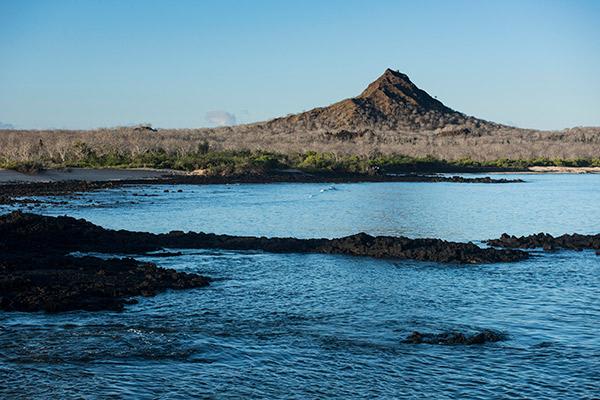
Darwin Bay & El Barranco (Prince Philip’s Steps)
AM: In the morning, visit Darwin Bay, which is the only sandy beach found in the caldera on Genovesa. Colonies of the Great Frigates are found along the beach. Male exhibit their red balloon pouch to females for the hope of a match. Red-footed boobies nest in the trees in contrast to the other two booby species which do so on the ground.
PM: In the afternoon, you will go to El Barranco (Prince Philip’s Steps), a carved out of stone stair. This will lead you to a wide plateau, where you can observe large colonies of masked boobies, frigate birds, storm petrels, and ducks. During this easy stroll, you will cross a small Scalesia forest, the habitat of the short-eared owl. The same path will lead you back to your boat.
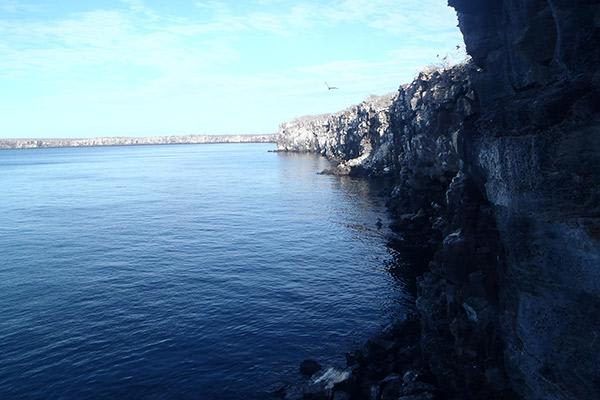
Disembarkation
AM: In the morning, after breakfast, the Twin Craters will be visited. Located in the highlands of Santa Cruz on the road to Baltra airport from Puerto Ayora, these scenic craters are approximately 30 meters deep. These two huge land depressions are surrounded by a Scalesia forest with abundant birds such as the yellow warbler and the Vermilion Flycatcher. Gorgeous views of the leafy green highlands forest are also part of the visit.
We will disembark from the cruise at 8:00 AM from Baltra Port. After this last visit, you will be transferred to Baltra airport for your return flight to mainland Ecuador. Assistance will be provided until we bid you farewell at the airport.
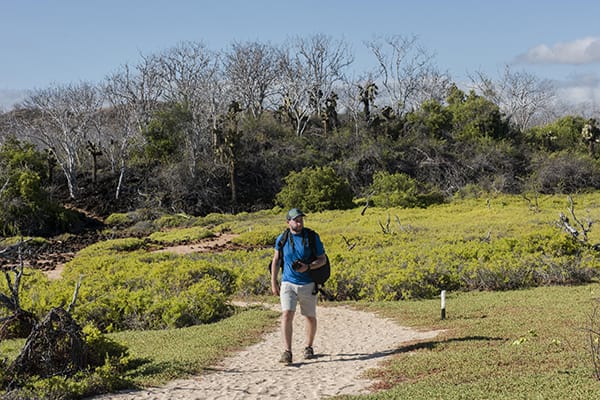
Embarkation
AM: Upon arrival, reception, and assistance at the airport, transfer from Baltra Airport to the M/C Endemic. We will embark at 10:15 AM from Baltra Port.
PM: In the afternoon, you will visit Sullivan Bay, located on the east coast of Santiago Island. We land on a white coral sand beach and begin our walk over lava that flowed less than 100 years ago. This is the perfect place to see and feel the volcanic origin of the Galapagos. Also in this area, you will admire flora that grows in lava fields.
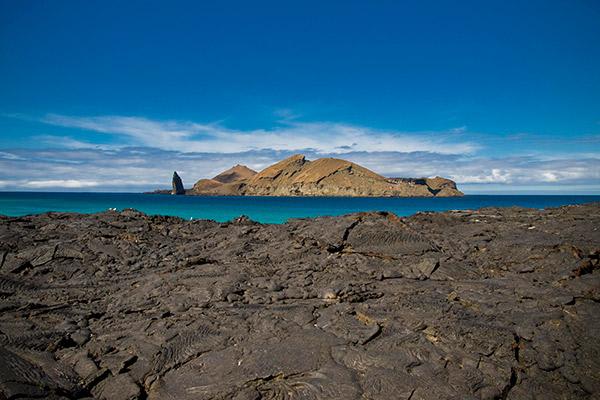
Wetlands / Sierra Negra Volcano & Breeding Center / Wall of Tears
Isabela Island is the largest of the archipelago with a surface of 4,588 square kilometers. It encompasses more than half of the total land area of the Galapagos.
AM: In the morning, you will be transported to the Wetlands (Humedales), which are a complex of trails 6 kilometers long, located south of Isabela Island. They have a wide variety of flora and abundant birdlife, including gallinules, finches, stilts, and ducks among others. Or you may visit Sierra Negra Volcano, one of the largest craters in the archipelago with a diameter of five kilometers. It offers mesmerizing views with great contrast in colors between lava fields, vegetation, and fumaroles.
On the way up to Orchilla hill, giant tortoises and marine iguanas will appear. From this viewpoint, the spectacular scenery of the bay, the town of Puerto Villamil, volcanoes, islets, and rocks can be appreciated. Isabela wetlands have endemic and introduced species.
PM: After lunch visit the Arnaldo Tupiza Breeding Center of Isabela, infant, and juvenile giant tortoises can be seen until they are ready to be released and survive in the wild. Or you may visit the Wall of Tears. This is a man-made monument that has been built in the ’40s by prisoners since Isabela island was once an Ecuadorian penal colony, and building up the wall was part of the punishment. On the way back to the yacht, be ready to spot flamingos and other water birds.
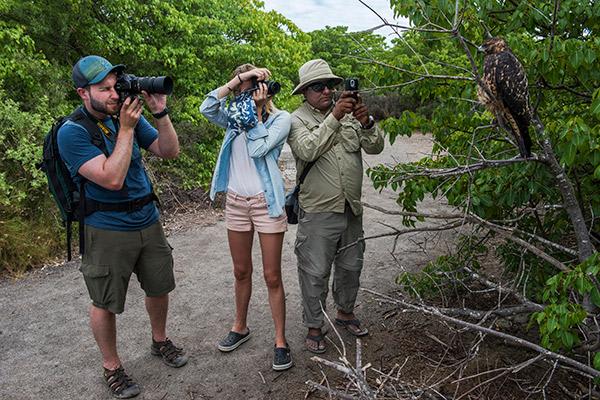
Elizabeth Bay & Urbina Bay
AM: In the morning, you will discover Elizabeth Bay, which is a marine visitor site. The excursion is carried out in a zodiac and so there is no landing point. Your zodiac ride starts with a visit to Mariela's islets where there is the largest and most important penguin colony in the Galapagos Islands. The excursion continues into the cove that is surrounded by red mangroves where you can spot sea turtles, flightless cormorants, spotted eagle rays, golden rays, brown pelicans, and sea lions.
PM: In the afternoon, Urbina Bay will be visited. Here you can see coral formations, large colored land iguanas. The possibility of seeing giant turtles, flightless cormorants, blue-footed boobies, penguins, and marine iguanas is excellent.
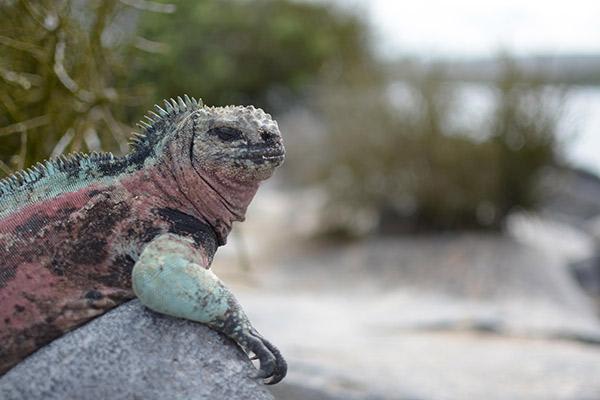
Tagus Cove & Espinoza Point
AM: After breakfast, Tagus Cove will be the first attraction to see. A ride along the cliffs in a zodiac will give visitors a good chance to see the Galapagos penguin, the flightless cormorant, and other sea birds. From the landing dock, it is about a 30-minute hike along the trail up to the top of the cliff from where you can view Darwin Lake, a saline lake saltier than the sea. You can also see several volcanoes from this location.
PM: After lunch, Espinoza point will be visited, which is one of Fernandina’s visit points. Located within a fascinating lava scenery with Lava-Cactuses. On the surface of the lava, mangroves thrive. The highlights are sea lions, penguins, the flightless cormorant (especially in spring and summer), and one of the biggest iguana colonies of Galápagos.
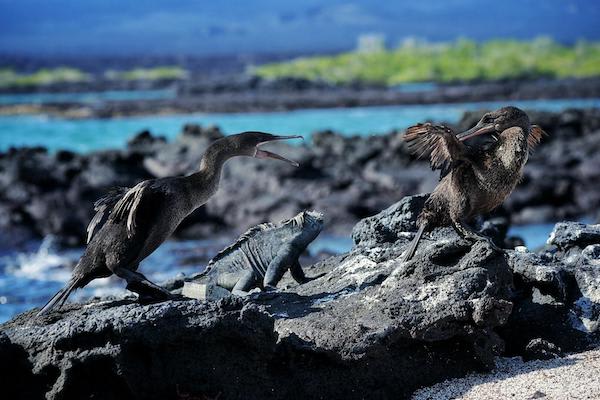
Buccaneer Cove / Espumilla Beach & Rabida Island
AM: In the morning, you will have the opportunity to discover Buccaneer Cove that is located just north of James Bay. It was known as a haven in the 17th and 18th centuries for pirates to stash their loot, take on freshwater, and capture tortoises for food. It is a nice place for a zodiac ride, snorkeling, and kayaking. Blue-footed, Nazca boobys, fur seals, and Galapagos hawks can be seen flying overhead.
Or visit Espumilla Beach will take place. It is a pristine sandy beach and a popular place for marine iguanas and Sally Lightfoot Crabs. The crabs attract the hunting herons, dancing predators, and prey. With an abundance of marine life including octopi, moray eel, and shark, snorkeling is recommended and available.
PM: In the afternoon, you will be taken to Rabida Island. Its main attraction is the red sand beach, famous for its cactus groves and rock formation scenery, aside from the vegetation of the arid zone and the presence of native and endemic species. During the walk on the red sand beach, you will see brown pelicans’ nests and a lagoon where flamingos are seen from time to time.
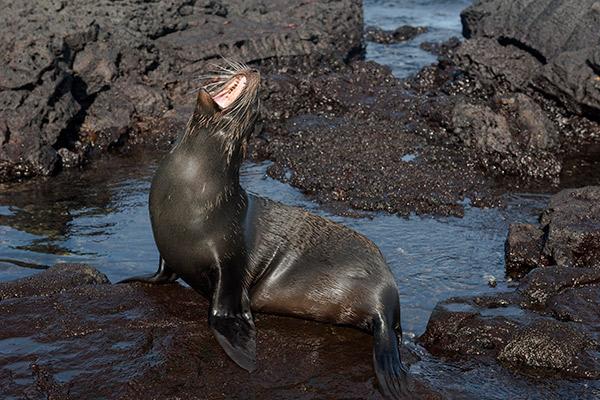
Disembarkation
AM: In the morning, visit Mosquera, a small islet found between Baltra & North Seymour Islands. Lava gulls, sea lions, Sally lightfoot crabs inhabit this sandbank with an extension of over 600 meters. It also hosts the largest populations of sea lions and orca whales that can be seen occasionally depending on the season you visit the islet.
We will disembark from the cruise at 8:00 AM from Baltra Port. After this last visit, you will be transferred to Baltra airport for your return flight to mainland Ecuador. Assistance will be provided until we bid you farewell at the airport.

Embarkation
AM: Upon arrival, reception, and assistance at the airport, transfer from Baltra Airport to the M/C Endemic. We will embark at 11:30 AM from Baltra Port.
PM: In the afternoon, visit Las Bachas, which is a beautiful white-sand beach, located on the northern coast of Santa Cruz Island. There you can go for a stroll or do some easy snorkeling in the gentle surf. Sea turtles lay their eggs at the edge of the vegetation. You can also look for a rusted pontoon, a relic of the Second World War. In fact, “bachas” is a poor pronunciation of “barges,” two of which were wrecked offshore at that time: the locals mispronounced the name and it stuck.
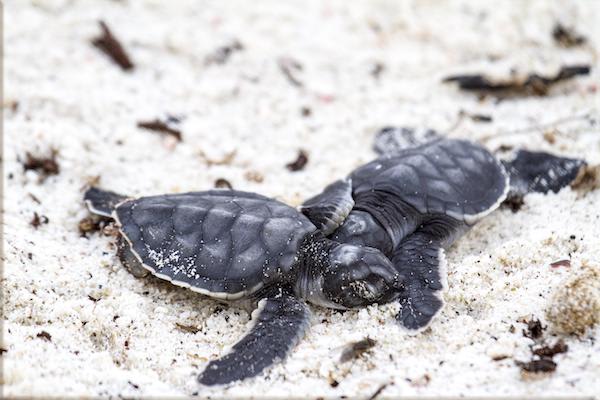
Darwin Bay & El Barranco (Prince Philip’s Steps)
AM: In the morning, visit Darwin Bay, which is the only sandy beach found in the caldera on Genovesa. Colonies of the Great Frigates are found along the beach. Male exhibit their red balloon pouch to females for the hope of a match. Red-footed boobies nest in the trees in contrast to the other two booby species which do so on the ground.
PM: In the afternoon, you will go to El Barranco (Prince Philip’s Steps), a carved out of stone stair. This will lead you to a wide plateau, where you can observe large colonies of masked boobies, frigate birds, storm petrels, and ducks. During this easy stroll, you will cross a small Scalesia forest, the habitat of the short-eared owl. The same path will lead you back to your boat.
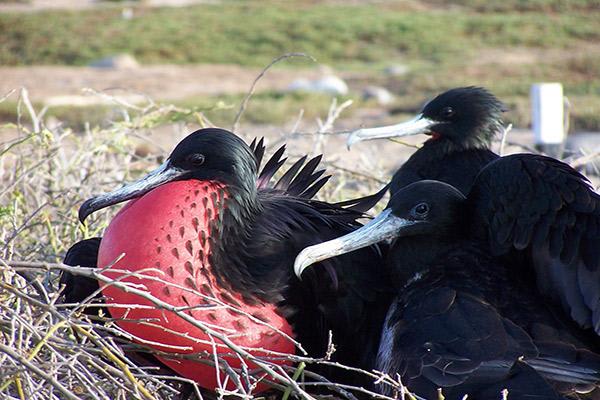
Twin Craters & Sullivan Bay
AM: In the morning, after breakfast, the Twin Craters will be visited. Located in the highlands of Santa Cruz on the road to Baltra airport from Puerto Ayora, these scenic craters are approximately 30 meters deep. These two huge land depressions are surrounded by a Scalesia forest with abundant birds such as the yellow warbler and the Vermilion Flycatcher. Gorgeous views of the leafy green highlands forest are also part of the visit. You will stay in the highlands of Santa Cruz island to see giant tortoises in the wild. This impressive animal gives the name to the archipelago. You can easily appreciate the Galapagos giant tortoises in their natural habitat, eating, walking among others. This is also a good place to see birds such as short-eared owls, Darwin’s finches, yellow warblers, Galapagos rails, and paint-billed crakes. As part of this experience, you will visit underground lava tubes formed by cooled and solidified lava. Then we will continue our journey to board the M/C Endemic.
PM: In the afternoon, you will visit Sullivan Bay, located on the east coast of Santiago Island. We land on a white coral sand beach and begin our walk over lava that flowed less than 100 years ago. This is the perfect place to see and feel the volcanic origin of the Galapagos. Also in this area, you will admire flora that grows in lava fields.
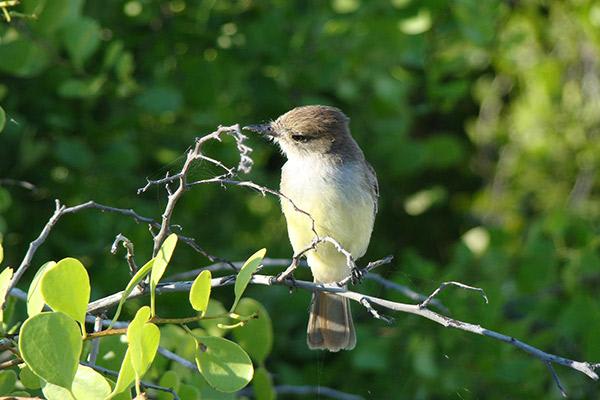
Wetlands / Sierra Negra Volcano & Breeding Center / Wall of Tears
AM: Isabela Island is the largest of the archipelago with a surface of 4,588 square kilometers. It encompasses more than half of the total land area of the Galapagos. In the morning, you will be transported to the Wetlands (Humedales), which are a complex of trails 6 kilometers long, located south of Isabela Island. They have a wide variety of flora and abundant birdlife, including gallinules, finches, stilts, and ducks among others. Or you may visit Sierra Negra Volcano, one of the largest craters in the archipelago with a diameter of five kilometers. It offers mesmerizing views with great contrast in colors between lava fields, vegetation, and fumaroles. On the way up to Orchilla hill, giant tortoises and marine iguanas will appear. From this viewpoint, the spectacular scenery of the bay, the town of Puerto Villamil, volcanoes, islets, and rocks can be appreciated. Isabela wetlands have endemic and introduced species.
PM: After lunch, we will visit the Arnaldo Tupiza Breeding Center of Isabela. Infant and juvenile giant tortoises can be seen until they are ready to be released and survive in the wild. Or you may visit the Wall of Tears. This is a man-made monument that has been built in the ’40s by prisoners since Isabela island was once an Ecuadorian penal colony, and building up the wall was part of the punishment. On the way back to the yacht, be ready to spot flamingos and other water birds.
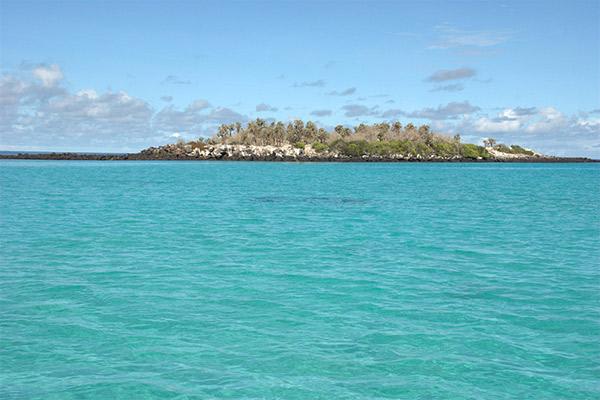
Elizabeth Bay & Urbina Bay
AM: In the morning, you will discover Elizabeth Bay, which is a marine visitor site. The excursion is carried out in a zodiac and so there is no landing point. Your zodiac ride starts with a visit to Mariela's islets where there is the largest and most important penguin colony in the Galapagos Islands. The excursion continues into the cove that is surrounded by red mangroves where you can spot sea turtles, flightless cormorants, spotted eagle rays, golden rays, brown pelicans, and sea lions.
PM: In the afternoon, Urbina Bay will be visited. Here you can see coral formations, large colored land iguanas. The possibility of seeing giant turtles, flightless cormorants, blue-footed boobies, penguins, and marine iguanas is excellent.
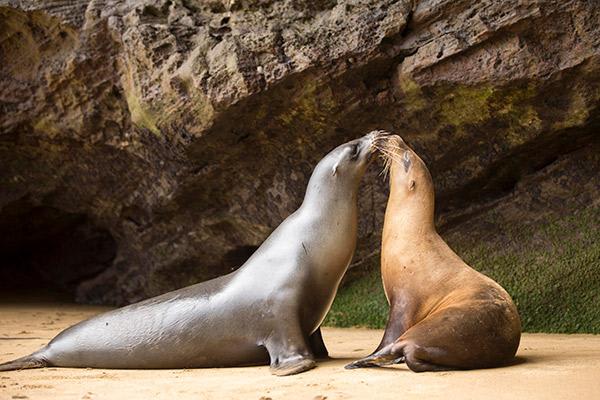
Tagus Cove & Espinoza Point
AM: After breakfast, Tagus Cove will be the first attraction to see. A ride along the cliffs in a zodiac will give visitors a good chance to see the Galapagos penguin, the flightless cormorant, and other sea birds. From the landing dock, it is about a 30-minute hike along the trail up to the top of the cliff from where you can view Darwin Lake, a saline lake saltier than the sea. You can also see several volcanoes from this location.
PM: After lunch, Espinoza point will be visited, which is one of Fernandina’s visit points. Located within a fascinating lava scenery with Lava-Cactuses. On the surface of the lava, mangroves thrive. The highlights are sea lions, penguins, the flightless cormorant (especially in spring and summer), and one of the biggest iguana colonies of Galápagos.
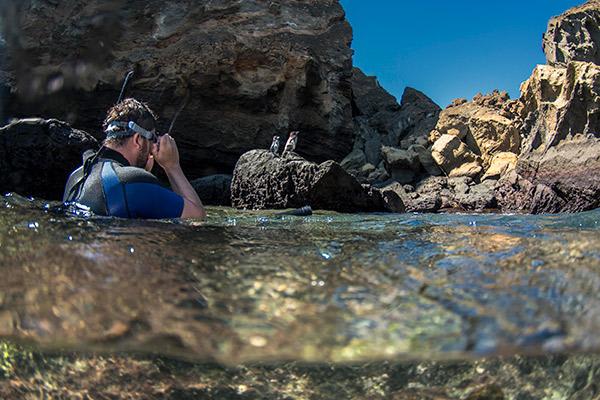
Buccaneer Cove / Espumilla Beach & Rabida Island
AM: In the morning, you will have the opportunity to discover Buccaneer Cove that is located just north of James Bay. It was known as a haven in the 17th and 18th centuries for pirates to stash their loot, take on freshwater, and capture tortoises for food. It is a nice place for a zodiac ride, snorkeling, and kayaking. Blue-footed, Nazca boobys, fur seals, and Galapagos hawks can be seen flying overhead. Or a visit to Espumilla Beach will take place. It is a pristine sandy beach and a popular place for marine iguanas and Sally Lightfoot Crabs. The crabs attract the hunting herons, dancing predators, and prey. With an abundance of marine life including octopi, moray eel, and shark, snorkeling is recommended and available.
PM: In the afternoon, you will be taken to Rabida Island. Its main attraction is the red sand beach, famous for its cactus groves and rock formation scenery, aside from the vegetation of the arid zone and the presence of native and endemic species. During the walk on the red sand beach, you will see brown pelicans’ nests and a lagoon where flamingos are seen from time to time.
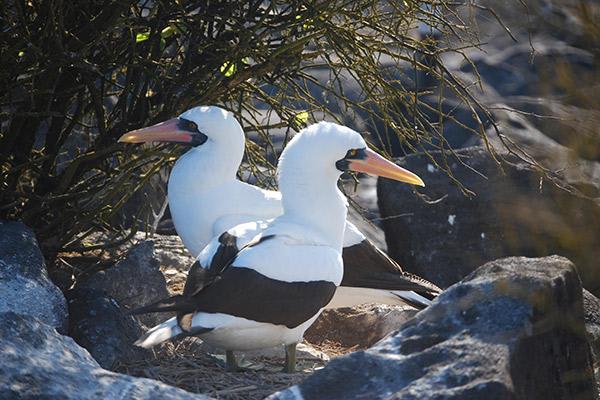
Disembarkation
AM: In the morning, visit Mosquera, a small islet found between Baltra & North Seymour Islands. Lava gulls, sea lions, Sally Light-foot crabs inhabit this sandbank with an extension of over 600 meters. It also hosts the largest populations of sea lions and orca whales that can be seen occasionally depending on the season you visit the islet.
We will disembark from the cruise at 8:00 AM from Baltra Port. After this last visit, transfer to Baltra airport for your return flight to mainland Ecuador. You will be assisted until we bid farewell at the airport.
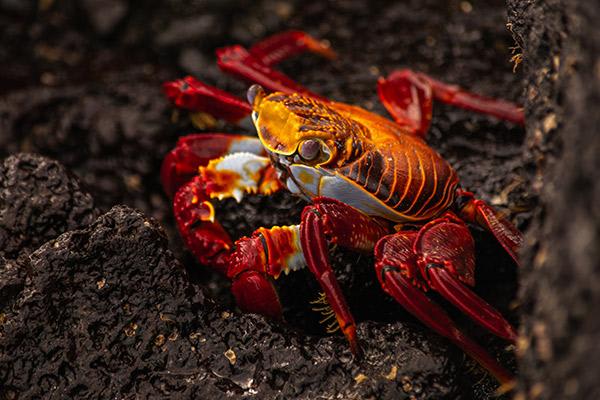
Embarkation
AM: Upon arrival, reception, and assistance at the airport, transfer from Baltra Airport to the M/C Endemic. We will embark at 11:30 AM from Baltra Port.
PM: In the afternoon, visit Dragon Hill will take place, which is located in the north-western part of Santa Cruz island. Here you will have the opportunity to walk into the island and view the land iguana. Be among these magnificent reptiles, that just a few decades ago were on the brink of extinction. Moreover, at Dragon Hill, you will see a flamingos’ lagoon, pintail ducks, and other endemic birds including flycatchers and warblers. After a short trek, an amazing view awaits us up the hill. Offshore snorkeling before returning to the yacht.
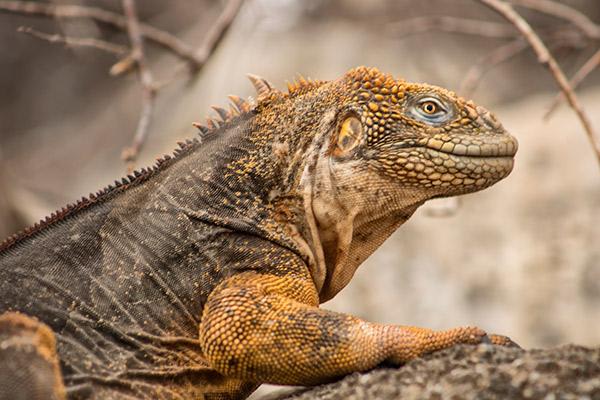
Kicker Rock, Witch Hill & Lobos Island
AM: In the morning, the first spot to be visited is Kicker Rock, an impressive geological formation due to erosion. This is a nesting place of sea birds. Additionally, curious sea lions and marine life can be found, such as fish, turtles, sharks, rays, representing the main attraction for snorkeling. This is a nice spot to take pictures.
The next attraction to see is Witch Hill, a tuff cone hill located southwest of San Cristobal. This name comes from the Spanish name of the bird known in English as Vermilion Flycatcher. A zodiac ride will take passengers into amazing rock formations along the island shore. A white sand beach and crystal-clear waters are part of this enchanted location. Fantastic opportunity for snorkeling.
PM: In the afternoon, you will be taken to Lobos Island, where a small population of blue-footed boobies, frigates, marine iguanas, and great frigate birds nesting can be observed. Snorkeling with sea lions in this calm bay is also part of the excursion.
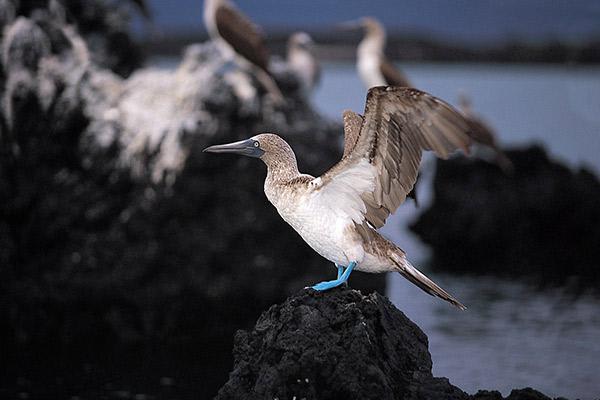
Gardner Bay / Osborn & Gardner Islets & Suarez Point
Española Island will be explored today. You will have the chance to observe endemic wildlife such as the Hood-Mockingbird. This is the southernmost island in the Galapagos archipelago, and home to several wildlife species, including masked and blue-footed boobies. Spectacular views from the top of a cliff.
AM: In the morning, after breakfast, the first attraction to be seen is Gardner Bay that provides an excellent beach for swimming. Around the small islets nearby, snorkelers will find lots of fish and sometimes turtles and sharks. The bay is also frequented by colonies of sea lions that like to swim with you. Or visit the Osborn and Gardner islets that are amazing for underwater discovery. Snorkeling is a highlight on this visitor point.
PM: After lunch, Point Suarez will be visited, which represents one of the most outstanding wildlife areas of the archipelago, with a long list of species found along its cliffs and sand or pebble beach.
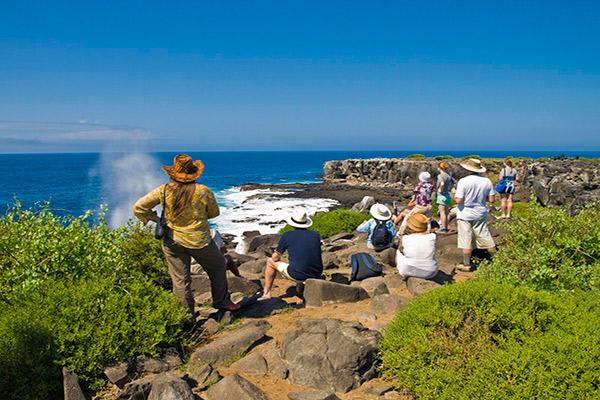
Santa Fe Island & Fausto Llerena Breeding Center
AM: In the morning, after breakfast, Santa Fe island will be visited, which is one of the most entertaining destinations for shore excursions in the Galapagos Islands. It has two trail choices for visitors, one of which takes you to the tallest Opuntia cactus in the Galapagos. While the other trail takes you into the highlands where land iguanas can be seen. After a long walk, the opportunity to swim in calm waters or snorkel with playful sea lions will be pretty tempting.
PM: In the afternoon, visit the Fausto Llerena Breeding Center, which is also known as Charles Darwin Research Station. This place has an information center, a museum, a library, and a tortoise breeding station. In the tortoise breeding station, you can encounter tortoises of different subspecies, which are prepared for reintroduction to their natural habitats. The most popular inhabitant of this Station is probably the Lonesome George turtle, which already died in 2012.

South Plaza Island & Bartholomew Island
AM: In the morning, South Plazas Island is the next island to be discovered. It has unique Sesuvium plants and Opuntia cactuses scattered across the landscape which provide some of the most interesting wildlife observations available in the Galapagos. Land iguanas are easily seen from the trail, frequently under the shade of cactuses, waiting for a prickly pear to fall.
PM: After lunch, you will discover Bartholomew Island. Once here, you will ascend to admire the spectacular panorama of Sullivan Bay and the famous Pinnacle Rock. The beaches at the foot of the Pinnacle Rock are excellent for snorkeling from which you can discover the marvelous underwater world, and with a little luck, you’ll get to snorkel with penguins.
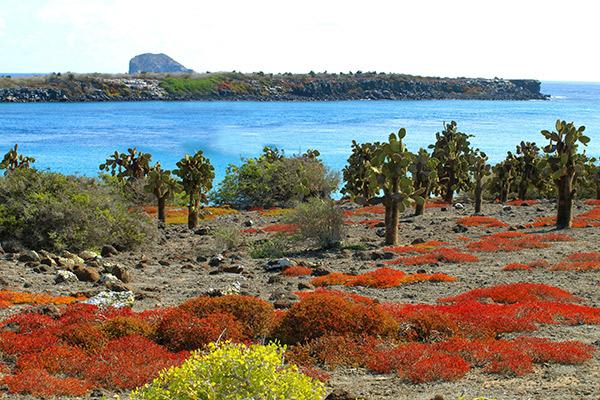
Devil ́s Crown / Cormorant Point & Baroness’ Lookout / Post Office Bay
AM: In the morning, after breakfast, the first spot to be visited is Devil's Crown that is an underwater volcanic crater, almost covered completely by Galapagos waters. Just a small portion of the rock formation can be seen from above and it looks like a crown. The underwater world is very rich in coral reefs, abundant marine species. Birds are also part of this visitor point due to their location in open waters. Or visit Cormorant Point where you will land on a green olivine sand beach. Following a 100 meters long path you will soon reach a lagoon with flamingos.
PM: In the afternoon, you will visit the Baroness’ Lookout (Mirador de la Baronesa). This viewpoint is located on the north of Floreana Island. The way up and the trail is very easy, steps are placed in this area for security. Your naturalist guide will tell the murder and mystery legend of the Baroness. Or you will go to the Post Office Bay, which keeps the legendary post barrel that whalers historically used to post their mail in.
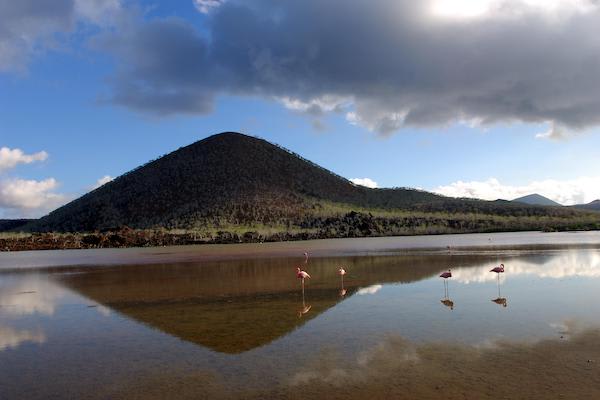
Chinese Hat & North Seymour Island
AM: In the morning, after breakfast, you will visit Chinese Hat, which is a small islet off the south coast of Santiago, with a maximum elevation of 160 feet (52 meters). Though within easy reach of Santa Cruz, Chinese Hat is typically only visited by those aboard a Galapagos Cruise.
PM: In the afternoon, you will discover North Seymour Island. It is located slightly to the north of Baltra. It is a low, flat island, formed by submarine lava formation uplift. Covered with low, bushy vegetation, it contains the largest colony of magnificent frigate birds in the Galapagos. There is also a large population of blue-footed boobies that perform an amusing courtship dance when nesting conditions are right.
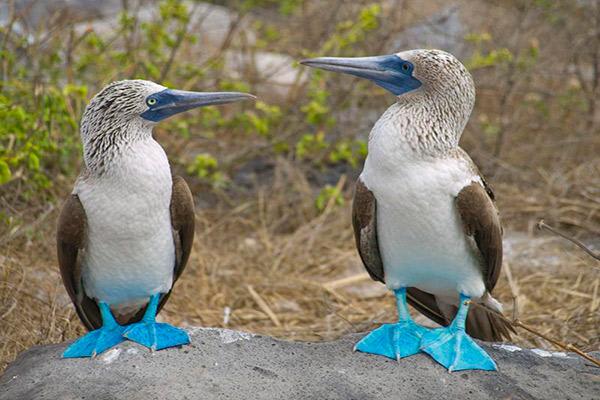
Disembarkation
AM: After breakfast, enjoy the visit to Black Turtle Cove, which is located on the north shore of Santa Cruz. It is a living illustration of how mangroves alter the marine environment to create a rich and unique habitat. Three mangrove species crowd the area from the shore out into the lagoon, which reaches almost a mile inland.
As you drift through quiet waters in the zodiac, you are likely to see spotted eagle rays and diamond-shaped mustard rays, which swim in a diamond formation. White-tipped reef sharks slip beneath the boat and Pacific green sea turtles come to the surface for air and to mate. Waterfowl, including pelicans, herons, and egret, all feed in the cove. This is a peaceful place that will make you feel calm.
We will disembark from the cruise at 8:00 AM from Baltra Port. After this last visit, transfer to Baltra airport for your return flight to mainland Ecuador. You will be assisted until we bid farewell at the airport.
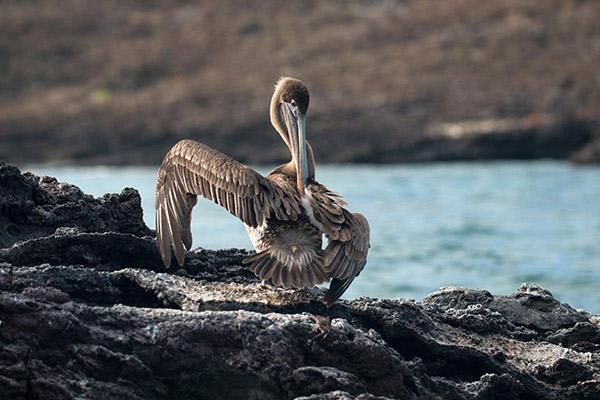
Accommodations
Social Areas
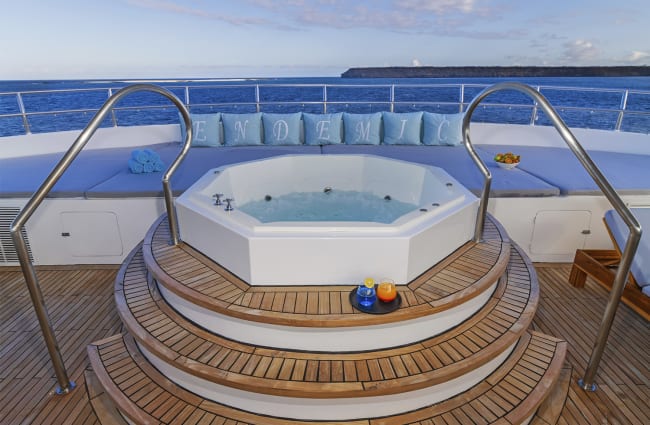
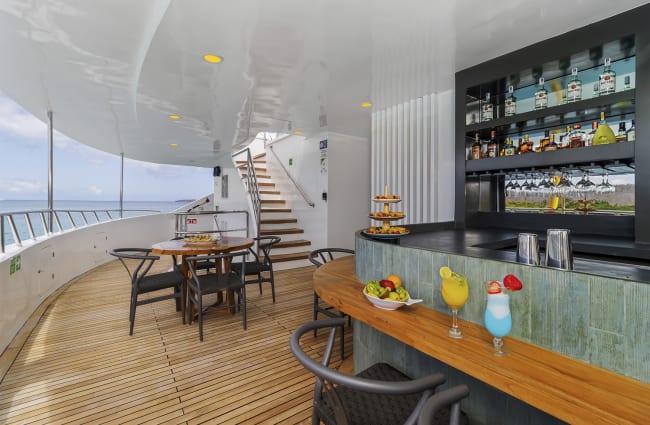





Suites & Cabins





Golden Suite
They are incredibly spacious, with two interconnected pairs on the upper deck. The rooms feature a fully equipped bathroom with hot water, hairdryer, body wash, and body lotion. The rooms have a balcony to relax and unwind on as you take in the oceanic scenery.
Related Cruises
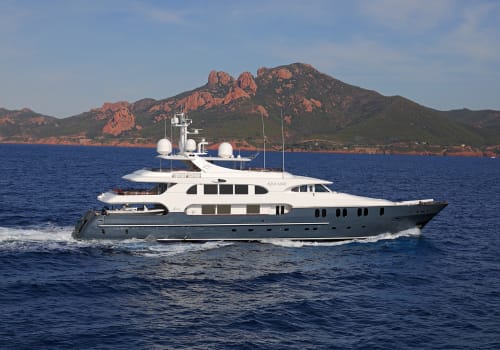
- Galapagos
- Ecuador
Aqua Mare

- Galapagos
- Ecuador
Galaxy Sirius
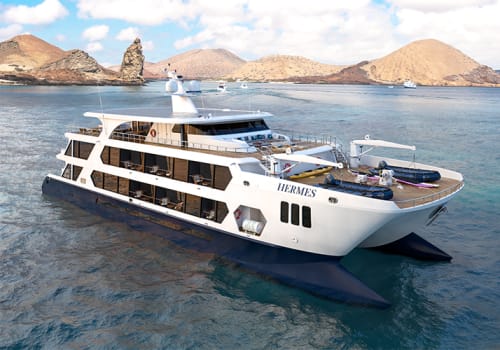
- Galapagos
- Ecuador
Hermes
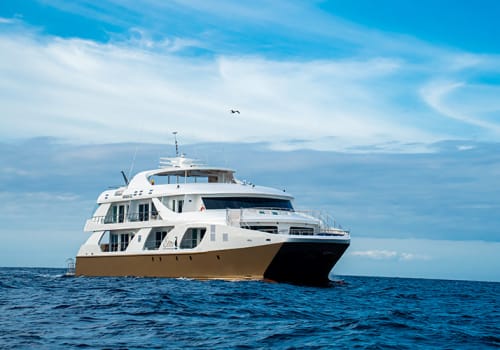
- Galapagos
- Ecuador
Elite
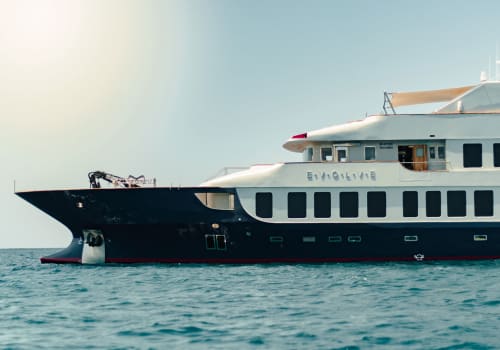
- Galapagos
- Ecuador
Origin, Theory & Evolve

- Galapagos
- Ecuador
Cormorant II
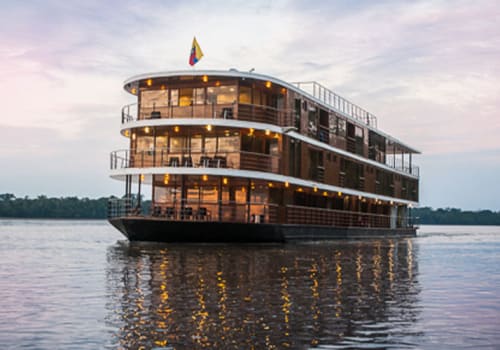
- Amazon
- Ecuador
Anakonda
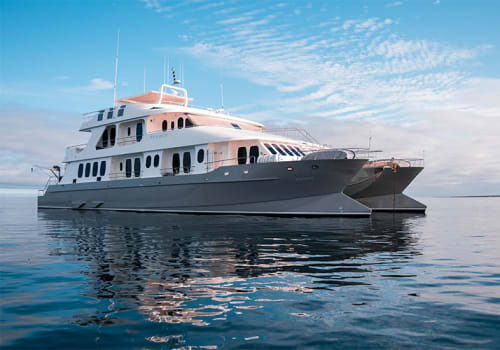
- Galapagos
- Ecuador
Alya
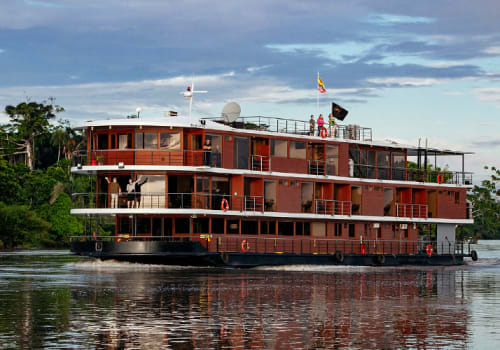
- Amazon
- Ecuador
Manatee Amazon Explorer
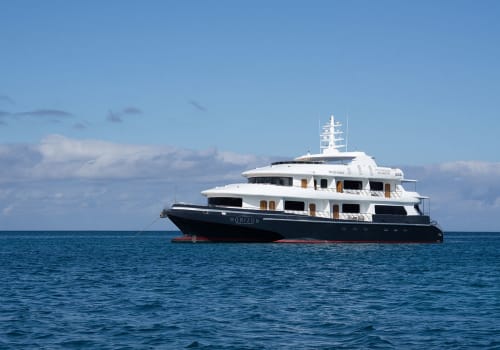
- Galapagos
- Ecuador
Galapagos Horizon
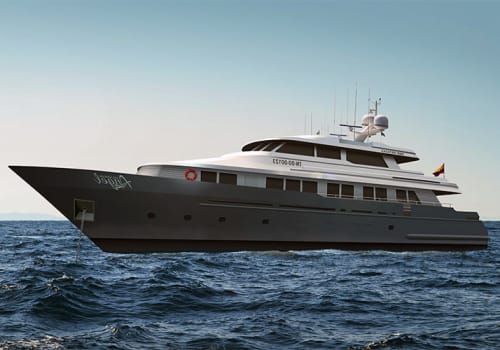
- Galapagos
- Ecuador
Galapagos Angel

- Galapagos
- Ecuador
Petrel

- Galapagos
- Ecuador

